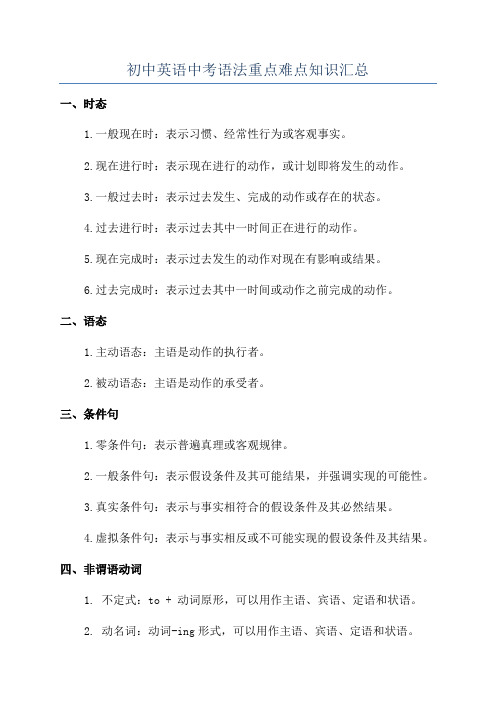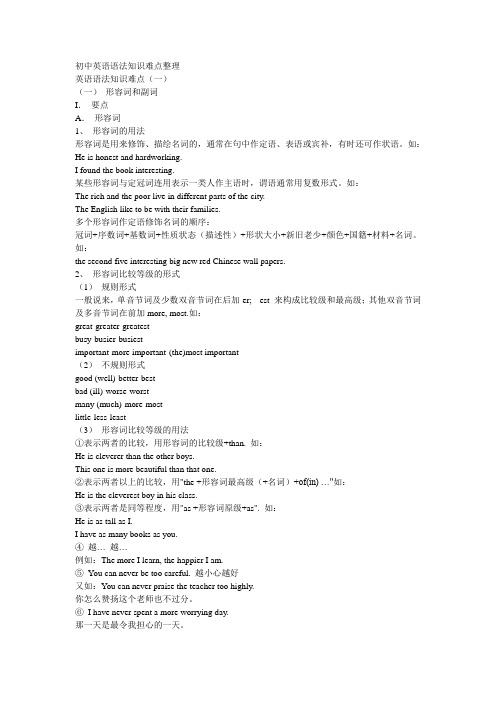中考英语语法难点汇总
初中英语语法知识难点大全

初中英语语法知识难点大全英语语法知识难点(一)(一)形容词和副词I.要点A.形容词1、形容词的用法形容词是用来修饰、描绘名词的,通常在句中作定语、表语或宾补,有时还可作状语。
如:He is honest and hardworking.I found the book interesting.某些形容词与定冠词连用表示一类人作主语时,谓语通常用复数形式。
如:The rich and the poor live in different parts of the city.The English like to be with their families.多个形容词作定语修饰名词的顺序:冠词+序数词+基数词+性质状态(描述性)+形状大小+新旧老少+颜色+国籍+材料+名词。
如:the second five interesting big new red Chinese wall papers.2、形容词比较等级的形式(1)规则形式一般说来,单音节词及少数双音节词在后加-er; --est 来构成比较级和最高级;其他双音节词及多音节词在前加more, most.如:great-greater-greatestbusy-busier-busiestimportant-more important-(the)most important(2)不规则形式good (well)-better-bestbad (ill)-worse-worstmany (much)-more-mostlittle-less-least(3)形容词比较等级的用法①表示两者的比较,用形容词的比较级+than. 如:He is cleverer than the other boys.This one is more beautiful than that one.②表示两者以上的比较,用"the +形容词最高级(+名词)+of(in) …"如:He is the cleverest boy in his class.③表示两者是同等程度,用"as +形容词原级+as". 如:He is as tall as I.I have as many books as you.④越… 越…例如:The more I learn, the happier I am.⑤You can never be too careful. 越小心越好又如:You can never praise the teacher too highly.你怎么赞扬这个老师也不过分。
2023中考英语重点知识归纳笔记

一.英语语法重点与难点1、as…as…结构:你和汤姆是一样好的孩子。
You’re a boy as good as Tom.=You’re as good a boy as Tom.2、(1)too…to与so…that sb. can’t…的句型转换:前者为简单句,主语只有一个,而后者为复合句,主语有两个,试比较:The man was too angry to be able to speak.The man was so angry that he wasn’t able to speak.(2) too…to…与not enough to句型的转换:He is too young to get married.=He is not old enough to get married.The book is too difficult for me to read.=The book is not easy enough for me to read.3、形容词原级表示比较级含义:约翰不象迈克那么苯。
John is not so stupid as Mike.John is less stupid than Mike.John is cleverer than Mike.4、用比较级表示最高级:约翰是班里最高的男生。
John is taller than any other boy in the class.John is the tallest boy in the class.5、the more….. the more….表示“越……越……”:The more books you read, the wider your knowledge is.The more food you eat, the fatter you are.6、more and more….表示“越来……越……”:More and more students realized the importance of a foreign language.Our country is getting stronger and stronger.二.中考考点—词组1. after, in 这两个介词都可以表示“……(时间)以后”的意思after 以过去为起点,表示过去一段时间之后,常用于过去时态的句子中?如:She went after three days. 她是三天以后走的in 以现在为起点,表将来一段时间以后,常用于将来时态的句子中如:She will go in three days. 她三天以后要走2. how long, how often, how soonhow long指多长时间,主要用来对一段时间(如three days, four weeks 等)提问?如:How long ago was it? 这是多久前的事了?how often指每隔多久,主要用来对频率副词或状语(如once a week等)提问?如:—How often does he come here? —Once a month. 他(每隔)多久来一次?每月一次。
中考英语必考语法

中考英语必考语法一.英语语法重点与难点1、as…as…结构:你和汤姆是一样好的孩子。
You’re a boy as good as Tom.=You’re as good a boy as Tom.2、前者为简单句,主语只有一个,而后者为复合句,主语有两个,试比较:(1)too…to与so…that sb. can’t…的句型转换:The man was too angry to be able to speak. The man was so angry that he wasn’t able to speak.(2) too…to…与 not enough to句型的转换:He is too young to get married.=He is not old enough to get married.The book is too difficult for me to read.= The book is not easy enough for me to read.3、形容词原级表示比较级含义:约翰不象迈克那么苯。
John is not so stupid as Mike.John is less stupid than Mike.John is cleverer than Mike.4、用比较级表示最高级:约翰是班里最高的男生。
John is taller than any other boy in the class.John is the tallest boy in the class.5、the more….. the more….表示“越……越……”:The more books you read, the wider your knowledge is.The more food you eat, the fatter you are.6、more and more….表示“越来……越……”:More and more students realized the importance of a foreign language. Our country is getting stronger and stronger.二.中考考点—词组1. after, in 这两个介词都可以表示“……(时间)以后”的意思✓after 以过去为起点,表示过去一段时间之后,常用于过去时态的句子中? 如:She went after three days. 她是三天以后走的✓in 以现在为起点,表将来一段时间以后,常用于将来时态的句子中如:She will go in three days. 她三天以后要走2. how long, how often, how soon✓how long指多长时间,主要用来对一段时间(如three days, four weeks 等)提问。
初中英语中考语法重点难点知识汇总

初中英语中考语法重点难点知识汇总一、时态1.一般现在时:表示习惯、经常性行为或客观事实。
2.现在进行时:表示现在进行的动作,或计划即将发生的动作。
3.一般过去时:表示过去发生、完成的动作或存在的状态。
4.过去进行时:表示过去其中一时间正在进行的动作。
5.现在完成时:表示过去发生的动作对现在有影响或结果。
6.过去完成时:表示过去其中一时间或动作之前完成的动作。
二、语态1.主动语态:主语是动作的执行者。
2.被动语态:主语是动作的承受者。
三、条件句1.零条件句:表示普遍真理或客观规律。
2.一般条件句:表示假设条件及其可能结果,并强调实现的可能性。
3.真实条件句:表示与事实相符合的假设条件及其必然结果。
4.虚拟条件句:表示与事实相反或不可能实现的假设条件及其结果。
四、非谓语动词1. 不定式:to + 动词原形,可以用作主语、宾语、定语和状语。
2. 动名词:动词-ing形式,可以用作主语、宾语、定语和状语。
3. 现在分词:动词-ing形式,可作定语、表语等。
4. 过去分词:-ed或不规则变化形式,常用作被动语态和完成时。
五、情态动词1. can/could:表示能力、许可、可能等。
2. may/might:表示允许、请求、可能、推测等。
3. must:表示推测、肯定、必需等。
4. should:表示义务、建议、推测、必要等。
六、名词1.可数名词与不可数名词及其用法。
2.名词所有格的表示方法。
七、代词1.人称代词:主格、宾格、物主代词、反身代词等。
2. 指示代词:this, that, these, those等。
3. 不定代词:some, any, no, every, all, both等。
八、形容词与副词1.形容词的比较级和最高级形式及其用法。
2.副词的比较级和最高级形式及其用法。
九、连词1. 并列连词:and, or, but等。
2. 从属连词:because, when, if, although等。
初中英语语法知识难点整理(精品)

初中英语语法知识难点整理英语语法知识难点(一)(一)形容词和副词I.要点A.形容词1、形容词的用法形容词是用来修饰、描绘名词的,通常在句中作定语、表语或宾补,有时还可作状语。
如:He is honest and hardworking.I found the book interesting.某些形容词与定冠词连用表示一类人作主语时,谓语通常用复数形式。
如:The rich and the poor live in different parts of the city.The English like to be with their families.多个形容词作定语修饰名词的顺序:冠词+序数词+基数词+性质状态(描述性)+形状大小+新旧老少+颜色+国籍+材料+名词。
如:the second five interesting big new red Chinese wall papers.2、形容词比较等级的形式(1)规则形式一般说来,单音节词及少数双音节词在后加-er; --est 来构成比较级和最高级;其他双音节词及多音节词在前加more, most.如:great-greater-greatestbusy-busier-busiestimportant-more important-(the)most important(2)不规则形式good (well)-better-bestbad (ill)-worse-worstmany (much)-more-mostlittle-less-least(3)形容词比较等级的用法①表示两者的比较,用形容词的比较级+than. 如:He is cleverer than the other boys.This one is more beautiful than that one.②表示两者以上的比较,用"the +形容词最高级(+名词)+of(in) …"如:He is the cleverest boy in his class.③表示两者是同等程度,用"as +形容词原级+as". 如:He is as tall as I.I have as many books as you.④越… 越…例如:The more I learn, the happier I am.⑤You can never be too careful. 越小心越好又如:You can never praise the teacher too highly.你怎么赞扬这个老师也不过分。
初中英语中考语法重点难点知识汇总

中考英语语法重点难点知识汇总一.英语语法重点与难点1、 as…as…结构:You’re a boy as good as Tom.=You’re as good a boy as Tom.你和汤姆是一样好的孩子。
2、 (1)too…to与 so…that sb. can’t…的句型转换:前者为简单句,主语只有一个,而后者为复合句,主语有两个,试比较:The man was too angry to be able to speak.The man was so angry that he wa sn’t able to speak.(2) too…to…与 not enough to句型的转换:He is too young to get married.=He is not old enough to get married.The book is too difficult for me to read.=The book is not easy enough for me to read.3、形容词原级表示比较级含义:约翰不象迈克那么苯。
John is not so stupid as Mike.John is less stupid than Mike.John is cleverer than Mike.4、用比较级表示最高级:约翰是班里最高的男生。
John is taller than any other boy in the class.John is the tallest boy in the class.5、 the more….. the more….表示“越……越……”:The more books you read, the wider your knowledge is.The more food you eat, the fatter you are.6、 more and more….表示“越来……越……”:More and more students realized the importance of a foreign language.Our country is getting stronger and stronger.二.中考考点—词组1. after, in 这两个介词都可以表示“……(时间)以后”的意思after 以过去为起点,表示过去一段时间之后,常用于过去时态的句子中如:She went after three days. 她是三天以后走的in 以现在为起点,表将来一段时间以后,常用于将来时态的句子中如:She will go in three days. 她三天以后要走2. how long, how often, how soonhow long指多长时间,主要用来对一段时间(如three days, four weeks 等)提问?如:How long ago was it? 这是多久前的事了?how often指每隔多久,主要用来对频率副词或状语(如once a week等)提问?如:—How often does he come here? —Once a month. 他(每隔)多久来一次?每月一次。
中考英语9大语法难点详解

中考英语9大语法难点详解宾语从句1. 宾语从句的含义充当主句宾语的从句叫做宾语从句。
如:She knew that the teacher had seen the film.她知道这位老师看过这部电影。
“that the teacher had seen the film”做knew 的宾语,同时又是由连接词that 引导的从句,所以它叫做宾语从句。
2. 宾语从句的分类(1)动词宾语从句:顾名思义,它是位于动词后面的宾语从句。
如:He asked whose handwriting was the best in our class.他问我们班上谁的书法最好。
(2)介词宾语从句:顾名思义,它是位于介词后面的宾语从句。
如:I agree with what you said just now.我同意你刚才说的话。
(3)形容词宾语从句:顾名思义,它是位于形容词后面的宾语从句。
如:I am afraid that I will be late. 恐怕我要迟到了。
3. 引导宾语从句的连接词(1)that:没有含义,在宾语从句中不做成分(2)whether/if:表示是否,在宾语从句中不做成分。
I don't know if /whether he still lives here after so many years. 我不知道这么多年后,他是否还住在这里。
(3)连接代词:what, which, who, whom, whose(在宾语从句中做主、宾、表和定语)连接副词:where, when, how, why(在宾语从句中做状语)The small children don't know what is in their stockings.(what 在宾语从句中做主语)这些小孩子不知道什么在他们的长筒袜里。
Could you tell me why you were late for the meeting this morning?(why 在宾语从句中做原因状语)你能告诉我为什么你今天早上开会迟到吗?4. 在做宾语从句的题目时应注意两点(1)时态:①当主句是现在时态时,宾语从句可以根据需要使用任何时态。
中考英语考试语法重点与难点

【导语】在初中阶段的英语学习中,⼤部分孩⼦英语出错都是因为语法问题。
由于语⽂的语法和英语的语法是完全不⼀样的,所以造就了很多孩⼦搞混淆了。
以下是整理的中考英语考试语法重点与难点,欢迎阅读!1.中考英语考试语法重点与难点 1、 as…as…结构:你和汤姆是⼀样好的孩⼦。
You’re a boy as good as Tom.You’re as good a boy as Tom. 2、 (1)too…to与 so…that sb. can’t…的句型转换:前者为简单句,主语只有⼀个,⽽后者为复合句,主语有两个,试⽐较: The man was too angry to be able to speak. The man was so angry that he wasn’t able to speak. (2) too…to…与 not enough to句型的转换: He is too young to get married.=He is not old enough to get married. The book is too difficult for me to read. The book is not easy enough for me to read. 3、形容词原级表⽰⽐较级含义: 约翰不象迈克那么苯。
John is not so stupid as Mike. John is less stupid than Mike. John is cleverer than Mike. 4、⽤⽐较级表⽰级:约翰是班⾥的男⽣。
John is taller than any other boy in the class. John is the tallest boy in the class.2.如何提升英语⼝语 ⼀、兴趣是可以培养的 做⼀件事,有兴趣总是会容易得多,快乐得多,甚⾄事半功倍。
- 1、下载文档前请自行甄别文档内容的完整性,平台不提供额外的编辑、内容补充、找答案等附加服务。
- 2、"仅部分预览"的文档,不可在线预览部分如存在完整性等问题,可反馈申请退款(可完整预览的文档不适用该条件!)。
- 3、如文档侵犯您的权益,请联系客服反馈,我们会尽快为您处理(人工客服工作时间:9:00-18:30)。
中考英语语法难点汇总介词I. 要点1、介词和种类(1) 简单介词,常用的有at, in, on, about, across, before, beside, for , to, without 等。
(2) 复合介词,如by means of, along with, because of, in front of, instead of 等。
2、介词和其他词类的习惯搭配关系(1) 和动词的搭配,如agree with, ask for, belong to, break away from, care about 等。
(2) 和形容词的搭配,如afraid of, angry with, different from, good at 等。
(3) 和名词的搭配,如answer to , key to, reason for, cause of, visit to 等。
3、介词短语可以有自己的修饰语,这种修饰语通常有right, just, badly, all, well, directly, completely 等少数几个副词。
如:He came right after dinner.He lives directly opposite the school.4、某些介词的意义与用法举例(1) at, on, in (表时间)表示时间点用at,如at four o'clock, at midnight 等;表示不确定的时间或短期假日也用at,如at that time, at Christmas 等。
指某天用on, 如on Monday, on the end of November, 指某天的朝夕用on,如on Friday morning, on the afternoon of September lst 等。
指长于或短于一天的时段用in,如in the afternoon, in February, in Summer, in 1999 等。
(2) between, among (表位置)between 仅用于二者之间,但说三者或三者以上中的每两个之间的相互关系时,也用between, 如I'm sitting between Tom and Alice.The village lies between three hills.among 用于三者或三者以上之间。
如:He is the best among the students.(3) beside, besidesbeside 意为"在……旁边",而besides 意为"除……之外"。
如:He sat beside me.What do you want besides this?(4) in the tree, on the treein the tree 指动物或人在树上,而on the tree 指果实、树叶长在树上(5) on the way, in the way, by the way, in this wayon the way 指在路上in the way 指挡道by the way 指顺便问一句in this way 用这样的方法(6) in the corner, at the cornerin the corner 指在拐角内at the corner 指在拐角外(7) in the morning, on the morningin the morning 是一般说法on the morning 特指某一天的早晨(8) by bus, on the busby bus 是一般说法on the bus 特指乘某一辆车II. 例题例1. Do you know any other foreign language ____ English?A. exceptB. butC. besideD. besides解析:A、B两项except 等于but,意为"除了……",C-beside 意为"在……旁边",不符合题意。
而D-besides, 意为"除了……之外,还有"。
所以该题正确答案为D。
该题意为:除了英语外,你还知道别的语言吗?例2. He suddenly returned ____ a rainy night.A. onB. atC. inD. during解析:我们均知道,at night 这一短语,但如果night前有修饰词,表具体的夜晚,则要用介词on 来修饰,故该题正确答案为A。
例3. I'm looking forward ____ your letter.A. toB. inC. atD. on解析:该题正确答案为A。
look forward to 为固定搭配,意为"期望、盼望"。
连词I. 要点1、连词的种类(1) 并列连词用来连接并列关系的词、短语或分句,如and, for, or, both … and, either … or, neither … nor 等。
(2) 从属连词用来引导从句,如that, if, whether, when, after, as soon as 等。
除了从属连词(引导状语从句)外,还有其它可以用来引导从句的词类。
它们是连接代词和连接副词(引导名词性从句),关系代词和关系副词(引导定语从句)。
2、常用连词举例(1) and 和,并且They drank and sang all night.(2) both … and 和,既……也……Both my parents and I went there.(3) but 但是,而I'm sad, but he is happy.(4) either … or 或……或……,要么……要么……Either you're wrong, or I am.(5) for 因为I asked him to stay, for I had something to tell him.(6) however 然而,可是Af first, he didn't want to go there. Later, however, he decided to go.(7) nei ther … nor 既不……也不Neither my parents nor my aunt agrees with you.(8) not only … but (also) 不但……而且……He not only sings well, but also dances well.(9) or 或者,否则Hurry up, or you'll be late.Are you a worker or a doctor?(10) so 因此,所以It's getting late, so I must go.(11) although 虽然Although it was late, they went on working.(12) as soon as 一……就……I'll tell him as soon as I see him.(13) because 因为He didn't go to school, because he was ill.(14) unless 除非,如果不I won't go unless it is fine tomorrow.(15) until 直到……He didn't leave until eleven. (瞬间动词用于not … until 结构)He stayed there until eleven.(16) while 当……时候,而(表示对比)While I stayed there, I met a friend of mine. (while 后不可用瞬间动词) My pen is red while his is blue.(17) for 因为He was ill, for he didn't come. (结论是推断出来的)(18)s ince 自从……I have lived here since my uncle left.(19) hardly … when 一…… 就I had hardly got to the station when the train left.(20) as far as 就…… 来说As far as I know, that country is very small.You may walk as far as the lake. (一直走到湖那里)II. 例题例1. John plays football ____, if not better than, David.A. as wellB. as well asC. so wellD. so well as解析:该题意为:John 踢足球如果不比David 好的话,那也踢得和David 一样好。
和…一样好为as well as. 故该题正确答案为B.例2. She thought I was talking about her daughter, ____, in fact, I was talking about my daughter.A. whenB. whereC. whichD. while解析:该处意为"然而",只有while 有此意思,故选D。
例3. Would you like a cup of coffee ____ shall we get down to business right away?A. andB. thenC. orD. otherwise解析:该处意为"或者",正确答案为C。
动词时态、语态I. 要点1、一般现在时(1) 表示经常发生的动作或现在存在的状态,常与sometimes, always, often, every day 等时间状语连用。
如:Sometimes, we go swimming after school.(2) 表示客观真理、科学事实等。
如:The earth goes round the sun.2、现在进行时(1) 表示说话时或现阶段正在进行的动作,常与now, at present 等时间状语连用。
如:What are you doing now?(2) 和always, continually 等连用,表一种经常反复的动作,常含有某种情感。
